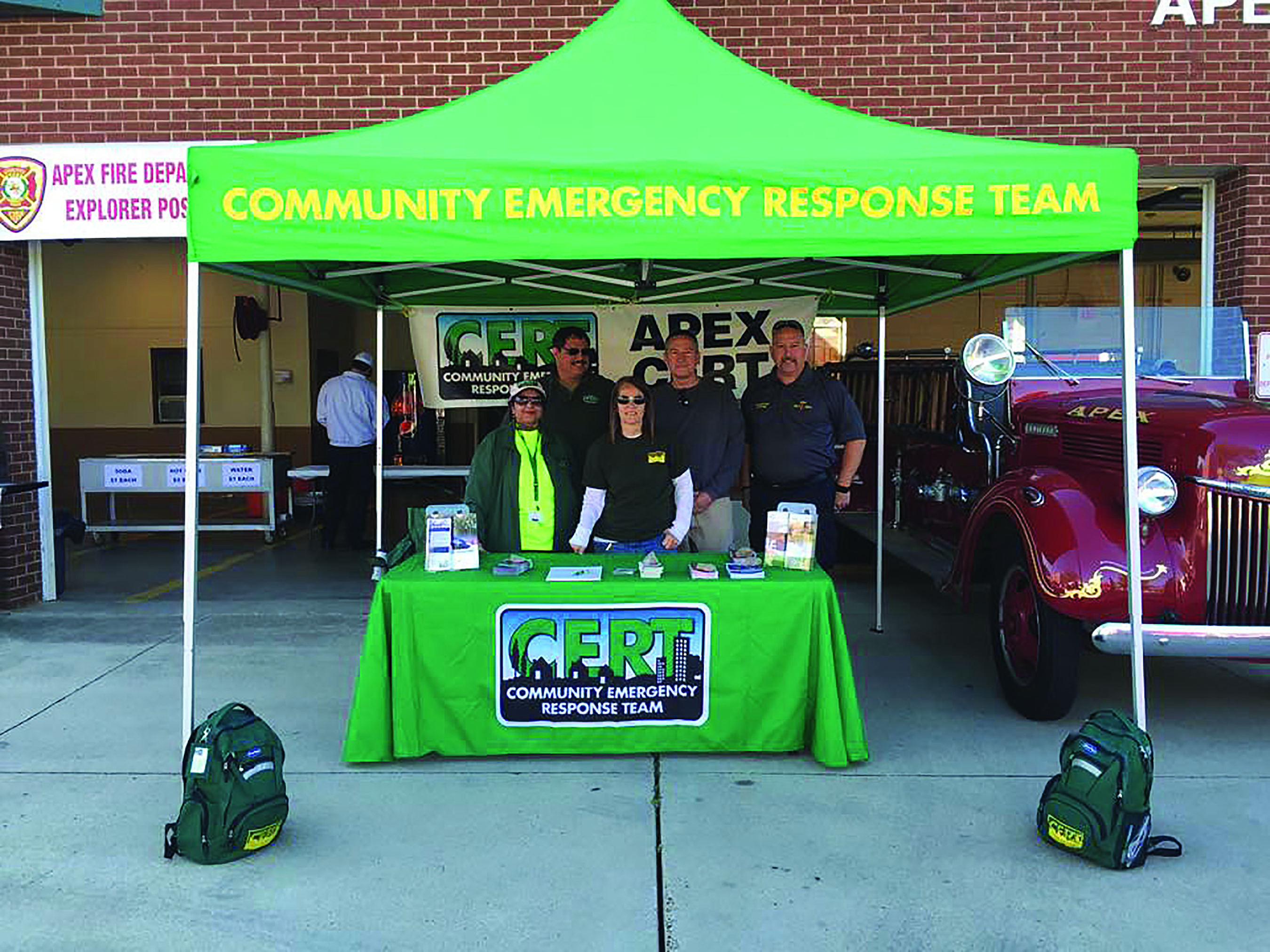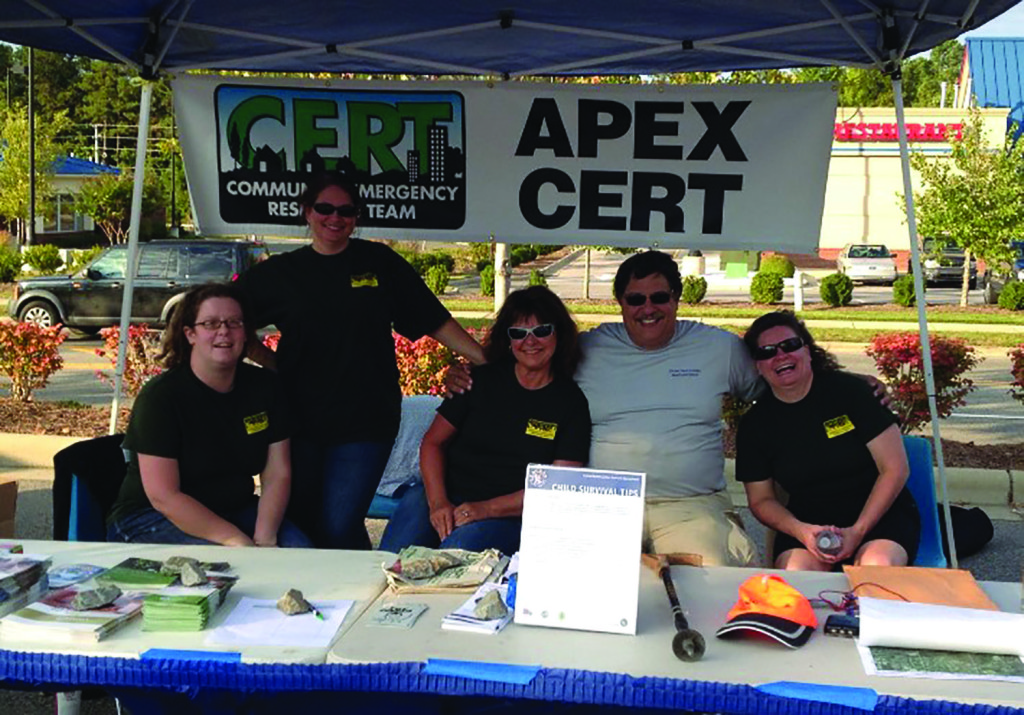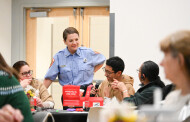We see it all the time on the news. Neighborhoods destroyed by tornados in a matter of minutes. Towns drowned by hurricanes or floods. Buildings reduced to heaps of concrete and steel by earthquakes or explosions.
Any of these scenarios and dozens of others could result in injuries, fire, missing people, gas leaks, chemical contamination, a loss of power and scarcity of food and water, and certainly…disorganization, confusion, and even panic.
If you were faced with a large-scale emergency, what would you do?
Most likely, you would want to make sure you and your family were safe. But what about your neighbors? What about your friends just across town? And what if Apex’s first responders were unable to get to you right away?
Now consider this. What if you had the training necessary to help yourself and others until our Fire Department, Police Department, or EMS teams arrive?
Community Emergency Response Team
Here in Apex, we have a Community Emergency Response Team (CERT) that operates in tandem with the Apex Fire Department. The CERT training concept originated in Los Angeles in 1985 and teams now exist across the country. Thanks to Apex Fire Department Battalion Chief Mike Beasley, CERT training began in Apex in 2008. “I became aware of CERT when I was taking a class. I thought it was a good way for the community and the Fire Department to work together and build some relationships, so I did the Train-the-Trainer [course]. It took a little while but finally, in 2010, we had a good group of people that jumped in and started helping out.”
At the time, Samantha Royster was at a career crossroad and she and her husband, Jay, took Beasley’s first CERT training class. “We were hooked instantly,” Royster says. “We loved it so much that he and I got [trained] so we could teach the class.” Royster began working for NC Emergency Management and is now the CERT Program Manager for the state of North Carolina and the Apex CERT Training Coordinator.
CERT Training
CERT training is free and available to any interested Apex resident. The initial basic training class is offered twice a year, in April and September, and consists of 21 hours over the course of one weekend. Some of the topics covered are medical triage, damage assessment, fire suppression, light search and rescue, disaster psychology, hazardous materials, and team organization.
“Part of what we teach is called the incident command system,” Royster explains. “It’s what first responders use as their structure hierarchy and how everybody works together. Every incident has to have an incident commander who’s in charge. All you need is one person to say ‘you—go call 911,’ ‘you—go find me an AED,’ and that person is the incident commander.” Royster emphasizes that anyone can take charge of a situation with the proper knowledge.
Every basic training class culminates in a full-scale simulation of a disaster situation. As Beasley describes, “It’s a scenario like some type of natural disaster and we’ll have victims staged throughout the property. The CERT team conducts their search and they triage the patients, they do treatment, and they remove the patients. We may throw in lifting exercises where they use levers and equipment to raise an object to free a victim.”
The exercise involves CERT “veterans” whom current students have not met. Royster feels that this is particularly important because, “If I need to do a head-to-toe assessment on you and I’ve never met you, it’s a little awkward because I’m going to be touching you and asking you questions. We put [students] right in that situation. Here’s a stranger you’ve never met before. Something’s wrong with him. Figure out what it is and how to fix it.”
CERT Roles
After basic training, many students become team members and join the 45 others currently on the active roster. Of course, training doesn’t end after the initial class and the CERT team doesn’t simply wait for a large-scale disaster to occur. Monthly drills and exercises keep skills fresh and add new ones.
Royster says, “One of our units beyond basic training is firefighter rehab. [Firefighters] come out of the fire and cool down and drink some water and another crew goes in. We check their vitals to make sure they’re cool. You want EMS to deal with people who are injured or burned or who have smoke inhalation. We can be doing the firefighter rehab.”
Decontamination is a new and key element of firefighter rehab. According to Beasley, “When you come out of a fire, you’ve been exposed to products of combustion, hydrogen cyanide being one of the worst ones that gets on your skin.” CERT teams will be trained in helping firefighters with hood exchanges—removing a contaminated hood and getting a new one—and using decontamination wipes on a firefighter’s face and hands before they eat or drink.
In addition to handling rehab logistics, CERT members set up staging areas, perform evacuations, and establish shelters in designated areas according to Red Cross guidelines. Everything for a shelter arrives from the Red Cross and needs to be set up. “They drop it off in a pod,” Beasley explains. “You set up the sleeping areas and things based on the equipment they bring you. [It’s] like a kit.”
Connecting with Our Community
CERT benefits both sides of our community—first responders and residents—by building relationships and sharing information. Royster says, “For something like Peakfest or Apex Night Out, we set up our tent and talk to people about disaster preparedness. At the same time, we’re promoting CERT and always recruiting.” Beasley adds, “When we have events downtown, [CERT] is there assisting with first aid and being present on the street for assistance.”
Apex Fire Chief Keith McGee came to Apex recently from Rocky Mount and CERT is a new concept to him. He praises the Apex CERT volunteers, saying, “We have a good relationship. They’re always willing to help us. Any time that we have a need, they’re happy to fill it and it lessens the burden on our staff. The teamwork element between CERT and Apex—that part is fantastic!”
Upcoming Training
Approximately 200 Apex residents have received CERT basic training. The next class is April 21 through April 23. Interested Apex residents should visit the Town of Apex website (apexnc.org) and navigate to the Fire Department page to fill out an interest form. Royster points out that, “CERT is for everybody. We can make accommodations and everybody can do this class.”
Taking the free CERT basic training course does not mean a student is under any obligation to join CERT. “The people that come to the training,” Beasley says, “take something away that they can use whether they decide to continue in CERT or not.” Royster agrees, “Even if they don’t join the team, that’s one more household that has heard about disaster preparedness. That’s the whole point of CERT—we want people to be able to take care of themselves until [emergency responders] arrive.”
The Apex CERT team has not yet had a formal deployment, and that’s a good thing. But in the event of a large-scale emergency, without a doubt, they will be ready. Can you say the same?









